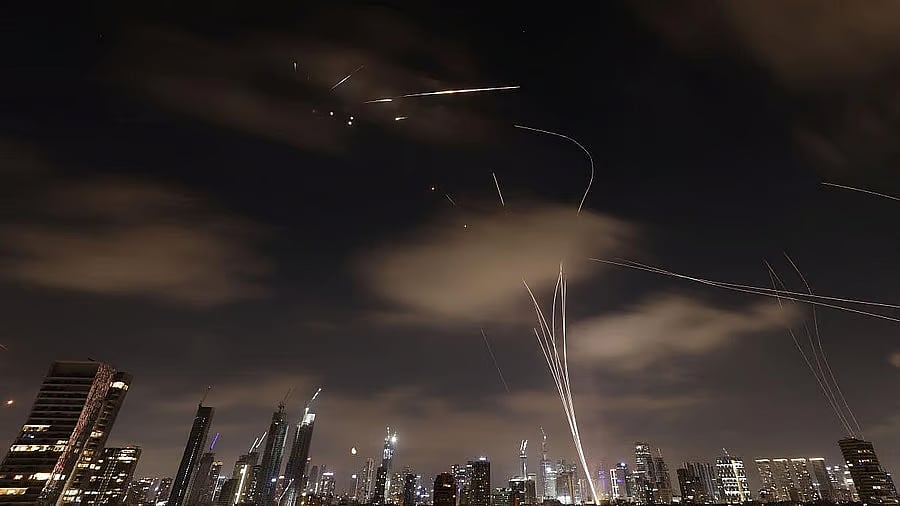
Missiles launched from Iran are intercepted as seen from Tel Aviv, Israel, June 18, 2025.
Credit: Reuters Photo
A week of Israeli air and missile strikes against its major rival has wiped out the top echelon of Iran's military command, damaged its nuclear capabilities and killed hundreds of people, while Iranian retaliatory strikes have killed at least two dozen civilians in Israel.
Iran has been using Fattah-1 and Sejjil missiles to carry out their recent strikes over Israel, media reports said.
Fattah-1 missiles, as reports suggest are hypersonic missile is developed by the Islamic Revolutionary Guard Corps and it is Iran’s first hypersonic medium-range ballistic missile.
The missile cannot be easily tracked by radars, defence systems as it moves very fast and is manoeuvrable.
It was first unveiled in 2023 and is considered to be a significant leap in the country’s missile programme by the Iranian officials.This hypersonic missile has a range of 1,400 km and is also capable of operating both inside and beyond the atmosphere of Earth.
Talking about the Sejjil missiles, Iran's Embassy in India said in a post on X, said, "The twelfth wave of Operation 'True Promise 3' has begun with the launch of ultra-heavy, long-range, two-stage Sejjil missiles,"
"Sejjil missiles, powered by solid fuel and with long-range capabilities, are among Iran’s most accurate and powerful strategic weapons. They possess the ability to penetrate and destroy critical enemy targets," the Embassy added.
Israel bombed nuclear targets in Iran on Thursday and Iranian missiles hit an Israeli hospital overnight, as the week-old air war escalated with no sign yet of an off-ramp.
Following the strike that damaged the Soroka medical centre in Israel's southern city of Beersheba, Prime Minister Benjamin Netanyahu said Tehran's "tyrants" would pay the "full price".
Defence Minister Israel Katz said the military had been instructed to intensify strikes on strategic-related targets in Tehran in order to eliminate the threat to Israel and destabilise the "Ayatollah regime".
Netanyahu has said that Israel's military attacks could result in the toppling of Iran's leaders, and Israel would do whatever was necessary to remove the "existential threat" posed by Tehran.
Israeli Foreign Minister Gideon Saar, speaking to reporters outside the damaged hospital, said "regime change" in Tehran was not a goal the security cabinet had set "for the time being".
US President Donald Trump, meanwhile, has kept the world guessing about whether Israel's superpower ally would join it in airstrikes.
Israel said on Thursday it had struck Iran's Natanz and Isfahan nuclear sites. It initially said it had also hit Bushehr, site of Iran's only functioning nuclear power plant, but a spokesperson later said it was a mistake to have said this.
The potential consequences of an attack on the plant - contaminating the air and water - have long been a concern in the Gulf states.
The head of Russia's nuclear energy corporation warned on Thursday that an Israeli attack on Bushehr could lead to a "Chornobyl-style catastrophe", referring to the world's worst nuclear disaster in 1986, when a reactor exploded at Chornobyl in Ukraine, then part of the Soviet Union.
Trump has veered from proposing a swift diplomatic end to the war to suggesting the United States might join it. On Wednesday, he said nobody knew what he would do. A day earlier he mused on social media about killing Iran's Supreme Leader Ali Khamenei, then demanded Iran's unconditional surrender.
(With Reuters inputs)
